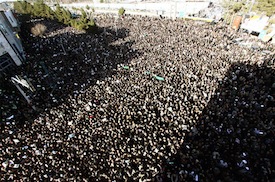The Bigger Picture of Engagement with Iran
March 5, 2010
Featured Image
Iran in Its Intricacy - Roger Cohen in the New York Times [link]
- Obama’s outreach [to Iran] has achieved this: the unsettling of Iran’s revolutionary power structure... But the 31-year gridlock in Iranian-American relations endures.
- There’s nothing new in U.S. hawks reducing Iran to a nuclear abstraction, its 70 million citizens subsumed into a putative warhead, its civilization ignored and its historical grievances against the United States glossed over — all in the name of making Persia a U.S. electoral pawn and a threat that demands bombs.
- It’s therefore worth outlining, before the drumbeat intensifies in the run-up to the mid-term U.S. elections, 10 truths about Iran...
- It is time for the United States to help Iran’s emergence from isolation — not with jingoism, nor empty punishments, nor bombs — but through firmness allied to creative diplomacy and sustained involvement.
Key U.N. Security Council Nations Hedging on Calls to Sanction Iran - Washington Post [link]
- The United States and its allies face resistance to sanctions on Iran not only from China, but from other influential countries on the U.N. Security Council, principally Brazil, Lebanon and Turkey, raising the possibility of a sharply divided vote on a sanctions resolution.
- The failure to secure a united front, particularly from the five veto-wielding members of the council, would send a weak signal to the Iranians, diplomats said.
- U.S. and European officials are eager to have the resolution adopted before a May 4-15 review conference on the 1970 Non-Proliferation Treaty, which sets the basic rules governing the use of nuclear weapons. One senior diplomat directly involved in the nuclear negotiations said that open-ended debate on Iran could "contaminate the atmosphere" there.
CTBT Ratification and Fact-Twisting Arguments - Alicia Godsberg in the FAS Strategic Security Blog [link]
- The familiar arguments against CTBT ratification have been debunked by various sources...
- Such facts continue to be ignored by those who want to keep open the option of designing and testing nuclear weapons – namely some of the people running the national labs, and those politicians and military personnel who are stuck in Cold War thinking.
- One argument against CTBT ratification that cannot stand is the misuse of the Strategic Posture Review Commission’s (SPRC) report… As a staff assistant to one of the twelve Commissioners, I would like to put to rest some of what are at best misconceptions about the SPRC’s CTBT section, and at worst deliberate manipulations of the facts.
- It is time to stand up to Cold War politicians and those in the military opposed to U.S. ratification of the CTBT and confront the misrepresentations of the facts head on, and past time to stop letting some at the national labs dictate policy instead of carrying out policy in the national interest.
China Wants to Restart North Korea Nuclear Talks Soon - Associated Press [link]
- ''China's goal is to restart the six-party talks in the first half of this year. That's our expectation, but it is difficult to say if this will be realized,'' envoy Wu Dawei was quoted as saying by the official China Daily newspaper.
- The comment from Beijing's envoy to the six-country talks follows a flurry of diplomatic efforts in recent weeks to prod North Korea into rejoining the negotiations. Envoys held a number of bilateral meetings aimed at restarting the process that has been stalled since last year.
A View from the Dark Side
Killing Airborne Laser Jeopardizes America - Maj. Gen. Bentley Rayburn in the Washington Times [link]
- Into the vacuum left by defeated Soviet troops in Afghanistan stepped the Taliban and al Qaeda. China remains an aggressive rival of the U.S., its military and economic ambitions growing. Iran funds Hamas in Gaza and Hezbollah in Lebanon. North Korea and Iran both stand on the nuclear precipice, thumbing their nose at the civilized world and destabilizing Asia and the Middle East.
- This is why the development of anti-ballistic-missile technology is so essential to U.S. security.
- Washington needs to understand that the American people want their country and their allies to be safe from missile attack, and that they want America to be a leader in technology.



